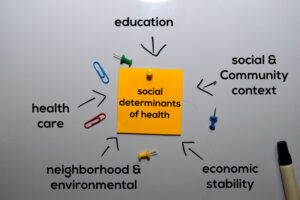
Social determinants fall into five main categories, according to Health.gov: economic stability, education access and quality, healthcare access and quality, neighborhood and built environment, and social and community context.
But Google argues there’s another determinant: information. That’s why the tech giant announced a series of updates on Monday at the Google Health Equity Summit. The event was held both virtually and in-person.
Below are three ways Google is battling health inequity:
1. Improving health information
YouTube, which is owned by Google, and the Kaiser Family Foundation (KFF) launched a collaboration on Monday called THE-IQ, or Tackling Health Equity Through Information Quality. The program will work with three organizations: The Loveland Foundation, National Birth Equity Collaborative and Satcher Health Leadership Institute. Each will create a video series to help people in underrepresented communities. YouTube will provide seed funding and education on video strategy, while KFF will work directly with each organization to help them produce their videos, said Tina Hoff, senior vice president of KFF, at the summit.
“It’s really critical that we amplify credible voices and provide it in ways that people can relate to and connect with,” Hoff said.

A Deep-dive Into Specialty Pharma
A specialty drug is a class of prescription medications used to treat complex, chronic or rare medical conditions. Although this classification was originally intended to define the treatment of rare, also termed “orphan” diseases, affecting fewer than 200,000 people in the US, more recently, specialty drugs have emerged as the cornerstone of treatment for chronic and complex diseases such as cancer, autoimmune conditions, diabetes, hepatitis C, and HIV/AIDS.
Each organization will frame their videos on certain topics. The Loveland Foundation will focus on mental health access for Black women and girls, the National Birth Equity Collaborative will center on improving outcomes for Black people giving birth and the Satcher Health Leadership Institute will create videos on the root causes of health inequities.
The partnership will make it easier for people to receive reliable healthcare information from trusted sources, said Garth Graham, head of YouTube Health, at the summit.
“We have a responsibility to make sure that people are finding information from evidence-based authoritative sources to help tackle the serious problem of medical misinformation,” he said. “Health leaders also have a responsibility to keep pace with the changes in where and how people find information. That’s why YouTube Health is investing in helping the industry to learn these skills, because you can connect with people in ways that are not only scientifically accurate, but also culturally relevant and engaging.”
Production of the videos will begin in September and the videos are expected to be released in November, according to a news release.
2. Advancing search features
In addition to fighting misinformation, Google is also improving search features ahead of the open enrollment period to help people find healthcare coverage. When people search for Medicare and Medicaid plans, they’ll receive additional information on eligibility requirements and enrollment for their states and the federal government, Hema Budaraju, senior director of search, health and social impact at Google, said at the event.
But even when people are enrolled in government plans, many still struggle to find healthcare providers, Budaraju said. To make this easier, Google has updated its search features so that people can filter for nearby healthcare providers that accept Medicaid, something it is already doing for Medicare.
“Studies show that people with lower incomes often lack access to healthcare and other services,” Budaraju said. “Now, the government offers benefit programs like Medicaid that can really provide and improve health outcomes. Yet, there are millions of people who are enrolled in these programs who don’t quite know how to access the services, and there are many who probably don’t have the right information.”
3. Expanding research
Lastly, Google is expanding the Fitbit Health Equity Research Initiative, which was launched last year to provide Fitbit and Fitabase resources to researchers analyzing health disparities and potential solutions. Fitabase is a data management platform that supports research with wearable devices. Last year’s awardees included organizations researching Black maternal, fetal and postpartum health; transgender youth sleep; diabetes and cardiovascular health in Latino communities; and adolescent health and wellbeing, according to a news release.
The application period to participate in the program is from September 12 to October 12. Those who are selected can win Fitbit devices and Google Cloud credits or funding. Additionally, with Fitabase, the researchers may be able to receive access to remote data collection and analysis tools.
Photo: syahrir maulana, Getty Images













